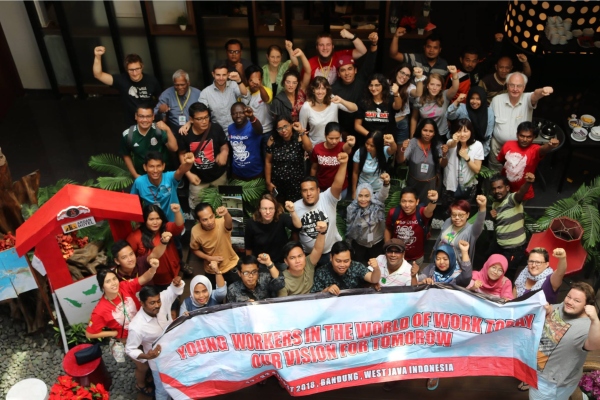A New Reality for Tomorrow’s Young Workers (26 September 2019, Bandung)

"Young Workers in the World of Work Today, our Vision for Tomorrow"
A New Reality for Tomorrow’s Young Workers
During the week of the 14th to the 23rd of August 2018, the International Youth Christian Workers (IYCW-JOCI) hosted a seminar in Bandung, Indonesia including organizations from around the globe. The seminar focused on young workers and their vision for the future of work in a world where technological, environmental, and societal changes are rapidly occurring. Organizations in attendance included the International Catholic Migration Commission (ICMC), the International Coordination of Young Christian Workers (ICYCW-CIJOC), Justitia et Pax Germany, the Office of the International Labor Organization (ILO) in Indonesia, the International Movement of Catholic Agricultural and Rural Youth (MIJARC), the World Movement of Christian Workers (MMTC), the International Trade Union Confederation (ITUC), among others. Together, the delegates were able to analyze labor issues, expand on their visions for the future, and produce concrete actions.
Click here to download the Report: https://drive.google.com/file/d/1UXzIYHP8J4f_aTJ3M24O69aEoyB2m7KQ/view
Haga clic aquí para descargar el Reporte: https://drive.google.com/file/d/1TQBB6HvhaDkkoUjiqnhp576FNkf3N7xe/view
Cliquez ici télécharger le Rapport: https://drive.google.com/file/d/1QBZ1Lg4wvFXHaBWPwkjZfxOlR2XmWNj0/view
The sustainability of jobs for young workers is a growing problem. Labor regulations are lacking in salaries, work hours, sick and maternity leave, health insurance, and social security. There is an inequality for female and migrant workers who have a higher difficulty of getting hired. Youth workers are also shown to have higher unemployment rates and are forced to take on unpaid internships in order to compete with older, experienced workers. The decline in development of labor law is resulting in a “flexibilization” of the labor market, which poses many concerns for young workers.
Precarious working arrangements such as short-term contracts, freelancing, online jobs and other forms of “flexibilized” work are resulting in a loss of social protection. Healthcare, unemployment, social security, and other benefits are sacrificed with the loss of long-term working contracts. Informalization of work can also lead to odd and/or long working hours, lower wages, and increased stress. Workers are unable to organize themselves within individual working arrangements and the sense of collectivity and the ability to unionize is lost.
With technology rapidly evolving, the digitalization of work is a growing phenomenon. The ability to always be connected to work is convenient but can lead to an increase in stress and a decrease in time spent with family and friends. Threats to job security may grow with the ability to complete work online and with robotization of workers. Social media adds to the stress of being constantly connected as well as providing many sources of misinformation. A deeper understanding and analysis of how technology is harming workers is needed to correct these issues.
Environmental changes pose a threat to labor and the health of workers. Pollution, rising temperatures, flooding, and a decrease in land are developing consequences of climate change. Food and water are greatly affected by ecological changes, harming the health of workers. The loss of land has resulted in a decline in the agriculture sector which often leads workers to migrate for jobs. Development of environmentally friendly policies will be instrumental in the protection of labor, food, and health.
The common vision held among the delegates is of just work interconnected with Christian values. This includes a commitment to and respect for young workers along with collective values of solidarity and a protection of human rights. The driving goals for the future of work include an absence of unemployment, equality in the workplace, and social protections without precariousness. The right to life, dignity, and development must be upheld within labor regulations. Technology must be utilized in the benefit of the people rather than in our detriment. Exploitation of workers and a lack of equality in the workplace will not be tolerated.
The delegates have established concrete plans including a grassroots approach to spread awareness on labor issues. The education and organization of young workers will help to promote a higher sense of collectivity and a regulation of online jobs will ensure workers are protected. A deeper analysis of environmental and technological issues needs to take place to address the consequences they have on the future of work. The delegates wish to stress to governments at all levels, the importance of labor issues and their wish to collaborate with them on working to solve them. Labor laws need to be reformed and enforced to ensure protection of all workers.
Finally, delegates are committed to collaborating with the Church and various organizations at the local, national, and international levels to broaden the scope of the movement. Participation from a variety of organizations and religious groups will help to increase visibility of labor issues and generate a larger impact. Together, delegates will continue to push for a future of just work through organization, education, and promotion of their global vision of equality and development in labor.

